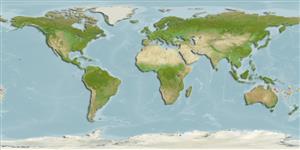Classification / Names
Common names | Synonyms | Catalog of Fishes(genus, species) | ITIS | CoL | WoRMS | Cloffa
Teleostei (teleosts) >
Gadiformes (Cods) >
Macrouridae (Grenadiers or rattails)
Etymology: Lucigadus: Latin, lucius, Greek, lykos = wolf; pike + Latin, gadus = a fish cod?. By its predatory habits (Ref. 45335); acrolophus: From the Greek word 'akrolophos', crest or mountain ridge, in reference to the submarine elevations in and around New Caledonia where the species has been collected..
More on authors: Iwamoto & Merrett.
Environment: milieu / climate zone / depth range / distribution range
Ecology
Marine; bathydemersal; depth range 405 - 450 m (Ref. 35908). Deep-water
Western Central Pacific: known only from off New Caledonia and the Norfolk Ridge.
Size / Weight / Age
Maturity: Lm ? range ? - ? cm
Max length : 18.0 cm TL male/unsexed; (Ref. 35909)
Short description
Identification keys | Morphology | Morphometrics
Dorsal spines (total): 2. Pelvic rays rarely 9. Body plain, without prominent markings; first dorsal fin dark over anterior four or so rays, pale anteriorly, no black spot; anal fin pale except for blackish distal margin of anteriormost rays. Scale patch on each side at base of anteriormost branchiostegal rays. Snout 28-32% HL, interorbital 28-35%, barbel 24-32%, scales below second dorsal 8.5-10.
Life cycle and mating behavior
Maturities | Reproduction | Spawnings | Egg(s) | Fecundities | Larvae
Iwamoto, T. and N.R. Merrett, 1997. Pisces Gadiformes: Taxonomy of grenadiers of the New Caledonian region, southwest Pacific. Mem. Mus. Natl. Hist. Nat. (176):473-570. (Ref. 35908)
IUCN Red List Status (Ref. 130435)
Threat to humans
Harmless
Human uses
Tools
Special reports
Download XML
Internet sources
Estimates based on models
Preferred temperature (Ref.
123201): 6.8 - 14.4, mean 12.6 °C (based on 11 cells).
Phylogenetic diversity index (Ref.
82804): PD
50 = 0.5039 [Uniqueness, from 0.5 = low to 2.0 = high].
Bayesian length-weight: a=0.00219 (0.00111 - 0.00431), b=3.20 (3.03 - 3.37), in cm total length, based on LWR estimates for this (Sub)family-body shape (Ref.
93245).
Trophic level (Ref.
69278): 3.4 ±0.4 se; based on size and trophs of closest relatives
Resilience (Ref.
120179): Medium, minimum population doubling time 1.4 - 4.4 years (Preliminary K or Fecundity.).
Fishing Vulnerability (Ref.
59153): Low vulnerability (10 of 100).
